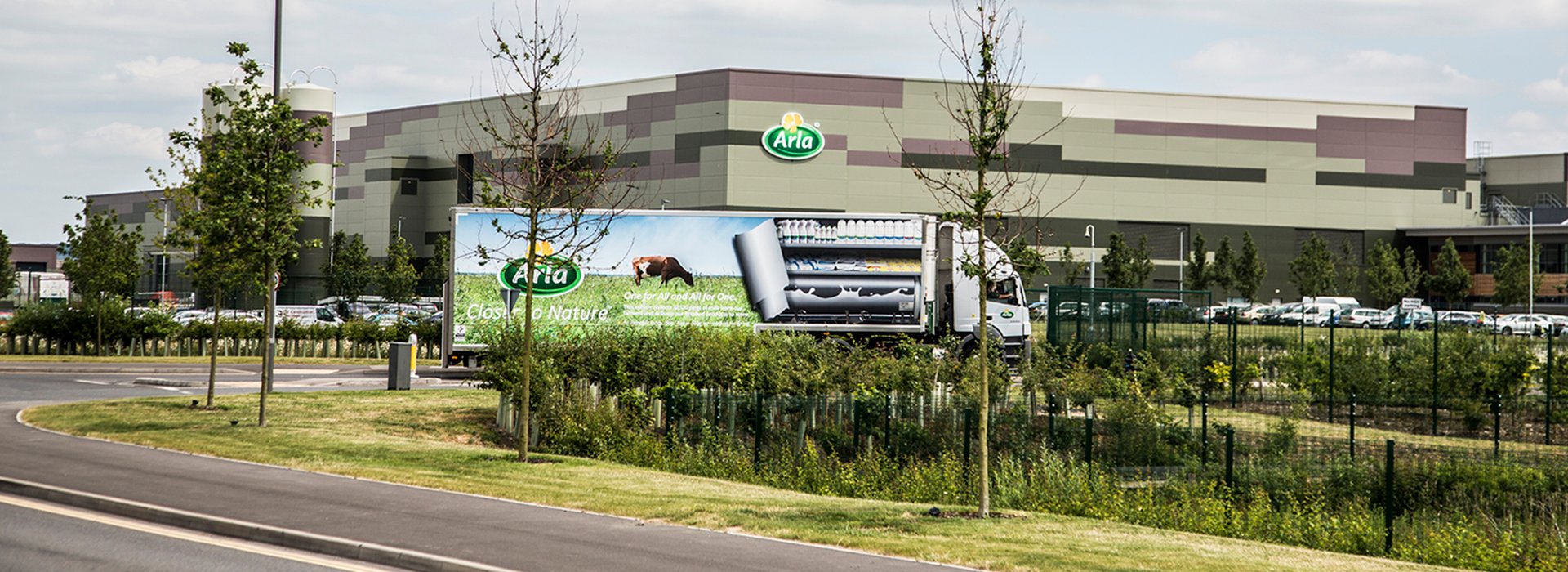How can European F&B companies address challenges to stay competitive?
The Food & Beverage (F&B) industry faces growing challenges from rising costs, inflation, supply chain disruptions, and strict sustainability regulations. To stay competitive, businesses must enhance efficiency, ensure safety, and reduce environmental impact. While the European F&B wholesaling sector has seen declining revenue, food manufacturing remains stable, highlighting shifts in distribution and market dynamics. Industry experts Tina Van Hoecke and Marcos Salla explore how companies can adapt to these changes and drive resilience in a rapidly evolving landscape.



Q&A with industry experts Tina Van Hoecke (TVH), Global Senior Channel Manager Organised Chains, Arla Foods, and Marcos Salla (MS), Global Director of Agri-business & Consumer Goods Industry, dss+ to discuss the highly dynamic and challenging landscape of the food and beverage (F&B) industry.
Q.
As industries face pressures to be more agile than ever before, what are the main challenges currently facing the F&B industry?
TVH: The F&B industry is facing a range of issues, including geopolitical conflicts, economic uncertainty, inflation, and price volatility. These factors, coupled with unpredictable consumer spending, make financial planning and projections more difficult than ever. Additionally, companies face mounting pressures around sustainability, driven by both regulatory requirements and consumer demand for environmentally responsible products. Balancing these goals with regulatory compliance, consumer expectations, and cost efficiency in such a disruptive landscape is no small task.
MS: Another key challenge is a shortage of skilled workers, which became more evident by the lockdowns and the rapid adoption of new technologies in the industry. Many workers moved to other sectors and have not returned, while others struggle to keep up with evolving digital tools and automation. To remain competitive, companies must rethink talent attraction and retention strategies, invest in upskilling and reskilling programs, and create work environments that support both technological adaptation and employee well-being.
Between 2020 and 2022, sales of plant-based foods across 13 European countries increased by 21%, reaching a record €5.8 billion3.
Q.
You mentioned consumers driving the pressure for environmentally responsible products. How difficult is this balancing act to meet regulations and customer demands whilst also managing costs?
TVH: It’s not easy at all, for example innovative packaging solutions and recyclable materials are inevitably raising costs, so it’s always a balancing act to optimise processes and technologies to stay aware and ahead of the cost management. Educating consumers about the value of sustainability and the reasons behind cost increases is crucial. When consumers understand the efforts being made, they are generally more willing to absorb the additional costs for a sustainable choice. This requires robust communication across multiple channels, including social media and product packaging. Collaboration among partners, suppliers, and customers is essential to communicate sustainability efforts more effectively.
MS: In terms of consumer spending, we are seeing that some consumers are being more proactive in terms of health and wellness and are willing to pay more for this. The bigger players are under huge pressure to optimise their menus to have a better nutritional score, offering healthier options to consumers. Vegetarian and vegan diets are also growing in popularity which in turn presents an opportunity for manufacturers to create plant-based foods and alternative sources of protein.
Q.
How can the F&B industry tackle the challenge of reducing its carbon footprint without compromising product quality or affordability?
TVH: If we use the example of the dairy industry, it is a nutrient-dense food, but it also comes with a carbon footprint that needs reducing. At Arla Foods, we are dedicated to bringing a positive impact. Through FarmAhead™ Customer Partnerships, we provide a toolbox of data-driven and science-based technologies that allow our customers in retail, foodservice, and the food industry to invest in on-farm sustainability efforts and directly contribute to reducing Arla’s emissions. By tracking over 200 data points, farmers can identify effective steps to reduce their carbon footprint, and we incentivise them through financial rewards. Together, we can encourage and support Arla farmers and their use of our FarmAhead™ technology toolbox to deliver further improvements for climate and nature. Sharing these insights with industry stakeholders, policymakers, and researchers helps drive continuous improvement.
It is important to consider both the challenges and the progress being made. Dairy farming remains one of the most efficient ways to provide natural, nutrient-dense, and protein-rich foods to a growing global population. The industry has been actively working on solutions to reduce its environmental footprint while continuing to deliver essential nutrition.
"Dairy farming remains one of the most efficient ways to provide natural, nutrient-dense, and protein-rich foods to a growing global population. The industry has been actively working on solutions to reduce its environmental footprint while continuing to deliver essential nutrition."
For example, in countries such as the Netherlands, where nitrogen emissions have been a key concern, the dairy sector has made significant advancements over the past two decades, drastically reducing nitrogen and CO2 emissions per cow.
Rather than seeing dairy as just an environmental challenge, it is crucial to recognize the progress being made and the role of dairy in feeding the growing world population naturally and sustainably. Through continued innovation and collaboration, we are committed to making meaningful contributions to a lower-carbon, more sustainable food system.
MS: Building on the example from the dairy industry, it’s clear that actionable insights and collaboration across the value chain are critical to reducing the carbon footprint. Companies that proactively plan their sustainability journey and embed it into their operations will lead the way. For instance, leveraging tools like FarmAhead™ demonstrates how data-driven approaches can help identify tangible improvements. Beyond compliance, these efforts are becoming a competitive differentiator, as consumers and regulators increasingly demand transparency and measurable results.
Those not yet on this path will face increasing challenges, not only from stricter regulations but also from supply chain and market pressures. Operational excellence plays a vital role here—it’s about integrating efficiency with sustainability, from energy use to waste reduction, while maintaining quality and affordability. The companies that can combine this focus with forward-thinking innovation, like rewarding sustainable practices or fostering partnerships, will not only meet today’s demands but shape the industry’s future.
Q.
How can F&B companies optimise their supply chain to enhance their response to market fluctuations and reduce costs while maintaining product quality?
TVH: Process optimisation always starts with digital integration, leveraging AI and data analytics to optimise product pricing, inventory management, and logistics. In Europe, the AI in F&B market is projected to reach $19.13 billion by 2030, growing at a CAGR of 40.6%. This digital integration can help companies respond to market changes and improve efficiency, which is critical in maintaining transparency. A more visible supply chain enables quicker coordination and identification of efficiencies, allowing companies to act swiftly on disruptions while keeping costs in check. The necessity of integral collaboration within the supply chain is evident, as seamless cooperation between stakeholders strengthens operational resilience and drives long-term success.
MS: Another effective way to optimise supply chains in response to market fluctuations is the shift towards local sourcing. While this can be challenging, it provides significant benefits, including greater control over supply continuity, reduced transportation costs, and enhanced responsiveness to demand changes. Companies that strategically align with local suppliers can improve cost efficiency while maintaining product quality.
At the same time, ESG pressures are accelerating this shift, as regulations increasingly demand greater transparency and sustainability throughout the supply chain. Businesses that delay action will face growing challenges, not just from compliance but also from supplier expectations higher up the chain. Aligning sourcing strategies with shared sustainability and cost goals can create resilient partnerships that reduce waste, optimise logistics, and enhance overall efficiency.
Q.
What strategies should F&B companies adopt to differentiate themselves from competitors in terms of product quality, sustainability, or consumer experience?
TVH: Greenwashing remains a problem, with some companies overstating their sustainability efforts. However, with ESG regulations, companies will need to back up their claims with data. Those who have genuinely embraced sustainability from the beginning will have a competitive advantage. At Arla Foods, we specifically work with data-driven and science-based technologies to drive meaningful change, as demonstrated with FarmAhead™. This ensures our customers that our sustainability claims are not just statements but are supported by tangible evidence and measurable impact. However, true sustainability comes with a cost, whether through investments in regenerative agriculture, advanced climate-friendly technologies, or financial incentives for farmers to lower their carbon footprint.
To maintain a competitive edge, it is crucial to communicate this reality transparently to our customers. When they understand the genuine effort, resources, and innovation behind sustainability initiatives, they are more likely to see value in their choices and support companies, such as Arla Foods, that take real action. Bridging this awareness gap is essential, not only to justify costs but also to build long-term partnerships and trust.
MS: Beyond transparency and regulatory compliance, true differentiation comes from a combination of high-quality products, cutting-edge technology, and operational excellence. Companies that integrate digital tools, AI-driven quality control, and smart manufacturing can elevate both product consistency and efficiency, reducing waste while maintaining premium standards.
Another key aspect is consumer engagement and experience. Sustainability should not only be a corporate commitment but also a customer value proposition. Brands that effectively educate consumers on their sustainability efforts - through clear labelling, interactive packaging (e.g., QR codes for traceability), and digital storytelling - will build stronger trust and loyalty.
Finally, risk management plays a crucial role. Companies that embed resilience into their supply chains - diversifying sourcing strategies, investing in regenerative agriculture, and leveraging predictive analytics - will be better positioned to adapt to disruptions while maintaining quality and sustainability commitments.
Differentiation is no longer just about product superiority; it’s about building an ecosystem where sustainability, efficiency, and customer engagement work together to create lasting value.
"At Arla Foods, we specifically work with data-driven and science-based technologies to drive meaningful change, as demonstrated with FarmAhead™."
Q.
And finally, despite all the challenges do you feel optimistic for the future?
TVH: Definitely. I’ve worked in the food & beverage industry for over 17 years, and I’d say it’s more important than ever to understand customers’ needs and challenges and how you can bring added value. It’s such an interesting business to work in and we have so many opportunities to drive innovation and make a positive impact.
MS: Absolutely. Despite the challenges, the F&B industry has the potential to lead meaningful change by focusing on operational excellence and sustainable practices. Companies that prioritise efficiency, adapt to shifting market demands, and align their strategies with consumer needs can address critical issues such as sustainability and consumer health. Collaboration across the value chain—among manufacturers, suppliers, and policymakers - will be essential in building resilience and driving positive impact. I remain confident that with the right strategies and partnerships, the industry can navigate these challenges and shape a more sustainable and impactful future.
Summary
The F&B industry is navigating a complex landscape shaped by geopolitical conflicts, economic volatility, inflation, and an ongoing shortage of skilled workers. These pressures are compounded by increasing sustainability demands from both regulators and consumers, requiring companies to balance cost management, regulatory compliance, and environmental responsibility. Key strategies such as digital integration, local sourcing, and clear sustainability commitments are critical to building resilience and maintaining competitiveness. While the challenges are significant, the industry holds large potential to adapt, innovate, and meet the evolving expectations of consumers and stakeholders, ensuring a promising future.
Key 3 tips to stay ahead…
- Strengthen supply chains: Invest in digital integration and local sourcing to enhance resilience, reduce costs, and adapt quickly to market fluctuations.
- Prioritise sustainability: Commit to transparent, measurable sustainability strategies that align with regulatory requirements and consumer expectations.
- Focus on workforce development: Address labour shortages by implementing upskilling programs and creating attractive working environments to retain talent.